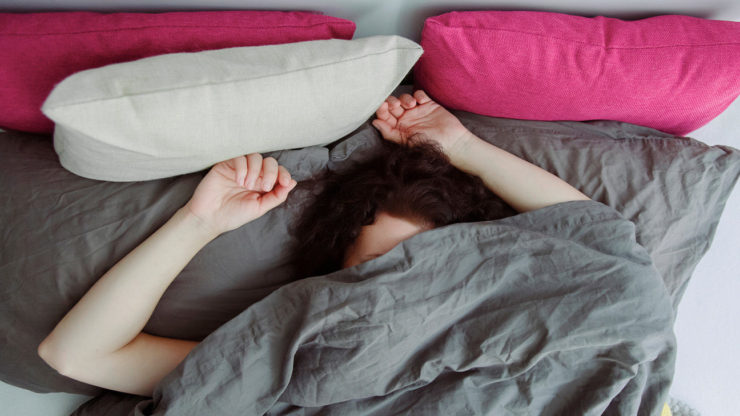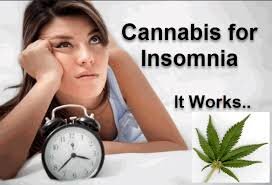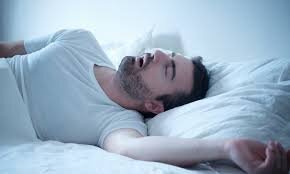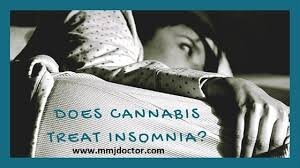Cannabis, COVID-19 and Insomnia

Medical cannabis can help ensure a delicious night’s sleep, especially in these trying times. Here’s how to use it and dose it to ensure optimal zzzzzzz’s.
Some 50 to 70 million Americans experience insomnia at some point in their lives according to the National Sleep Foundation. Based on what I’m hearing from my patients, this number is skyrocketing thanks to COVID-19. If getting some shut-eye is becoming harder for you, know that you’re not alone.
Make no mistake, sleep is crucial to our physical and mental functioning — it is essential to all of the body’s repair and restore functions. When at rest the body learns what’s wrong and physically “relearns” how to contend with the complexities and stressors of everyday life. Restful sleep has been proven to improve memory recall, regulate metabolism, and reduce mental fatigue. During sleep, the brain reorganizes and recharges while the body removes waste byproducts that have accumulated during the day. It’s almost as if our dream life represents our struggle to get back to balance.
When people are sleep-deprived, they suffer. Their cognitive abilities decline, their behavior and judgment become erratic. Fatigue makes us more emotional, anxious, more strung out, more on edge. It’s no fun and yes, it gets worse as we age in large part due to hormones, prescription medications, and chronic diseases.
As you’ve probably noticed, not all sleep aids work for everyone. There is no perfect drug that produces a normal sleep and dream pattern like a truly restful night’s sleep. Many medications produce a tolerance that requires higher and higher doses. When some people stop taking them, they suffer nasty withdrawal symptoms, including even more severe insomnia.
There’s no conclusive evidence that cannabis works infallibly for everyone with insomnia but preliminary evidence and my own experience of treating patients or over 15 years shows it is at least as effective as conventional pharmaceuticals. Getting to the right dose requires some experimentation, so you’ll have to invest a little time monitoring your doses. But if it does work you will not likely experience the same side effects as most prescription meds.
Below are some of the most common questions coming at me these days.
Why and how does cannabis work for sleep disruption?
Anxiety, stress, and chronic sleep deprivation all inhibit GABA, a naturally occurring brain chemical that directs neurons to slow down or stop firing. This neurotransmitter also helps to induce sleep, relax muscles, and calm us down. In essence, GABA directs the body to chill out.

Cannabis modulates GABA, helping return the body to its more normal functions. Careful dosing may help stem the racing thoughts that cause disrupted sleep and panicked awakenings during the night. It can also be used to treat what are called “parasomnias,” sleep disorders like jaw grinding, sleepwalking, or nightmares.
The “cannabis molecules” produced by your own body (endogenous cannabinoids) make you resistant to stress, similar to the way endorphins provide natural relief from pain. Integrating optimally-dosed cannabis products can help bring the body back into balance.
Some of the researchers I’ve read online say that marijuana is no better than sleeping pills and that it robs the body of REM sleep.
Prescription sleep aids (i.e. Ambien, Lunesta, etc.) don’t deliver a restorative sleep. They actually replace our normal sleep cycles and dreams and result in “counterfeit sleep” — studies show they only increase natural sleep by 8 minutes. Instead, they produce a type of sleep amnesia — you forget that you had a crappy night! Benzos (i.e. Xanax, Klonopin, etc.) are often prescribed for insomnia, but they are only supposed to be used short term, 2 – 4 weeks maximum. If taken longer, they can be as addictive as opioids. Weaning from Xanax and Ambien can take up to a year because of the severe withdrawal symptoms and emotional dependence.
THC can decrease the amount of time it takes to fall asleep but just like alcohol, it does block REM sleep. CBD also cuts the time it takes to fall asleep. In my clinical experience, combining both THC and CBD in the right dosage and ratio can be very effective in helping chronic sleep sufferers.
I’ve heard that once I start using medical cannabis I’ll have to constantly increase the amount I use.
It is true that you can build a tolerance to cannabinoids if you use them regularly. But it’s also easy to reset or “resensitize” your receptors by stopping use for a few days. If you’re needing increasingly higher doses of cannabinoids to get to sleep, simply take a break for 4 or 5 days. (You can use up to 10 mg of melatonin and Magnesium Taurate, or 650 mg of Valerian while you take your cannabis holiday). Staying off cannabinoids for 4 or 5 days allows receptors to flush themselves out. After this break, you can begin again by taking a very small amount — one or two vapor puffs or a few mg of tincture — until you feel a shift. Start there. You’ll probably be surprised to learn that you’ll get the same relief on a much lower dose. You can increase that dose slowly if required.
Not only does CBD reduce the amount of time it takes to fall asleep, but it decreases overall body inflammation and calms the nervous system. If integrated carefully throughout the day in a microdosed regime, it can balance your circadian rhythms and help you with effortless sleep.

I often notice that when something upsets me during the day it comes back to haunt me in the night. That’s when I wake up and can’t get back to sleep. Any ideas on how to contend with this?
That’s a stress response and cannabinoids also work to mitigate stress. In these cases, 10-40 mg of CBD — or in some cases CBD that is activated with 1-3 mg doses of THC — can reduce anxiety that occurs during the day.
Here’s how this works: CBD directs the brain to activate the parasympathetic nervous system, which induces a state of calm. It works well for social anxiety and everyday stress, plus more extreme forms of anxiety such as panic attacks. One small study showed it even “reduced anxiety in public speakers” so if you’re gearing up for that online TED Talk, take note!
Some of my patients carry a CBD vape pen or tincture with them during the day. If they have a stressful situation like a job interview or a confrontation coming up they use it in advance to keep calm. Others use it to steady themselves after an anxiety-provoking situation. You may want to try these strategies.
I just can’t get to sleep these days. My mind won’t stop chattering.
To fall asleep faster, you’ll want to use a CBD:THC combination before bedtime. A little THC is a good idea because as the feelings of being mildly high taper off (60-90 mins) it produces a sedative effect that encourages sleep. Low light enhances also CBD’s calming effects.
- If you’re inhaling flowers, begin with a small dose the size of a match head.
- If you’re using a vape pen, begin with a few puffs of a CBD or 1:1 CBD:THC oil and keep the room dark.
- If using tincture try 20-25 mg of 20C:1T or 16C:1T tincture 60-90 minutes prior to bed. You can experiment with the time you dose. This should keep you asleep for 4-6 hours.
- If you need more, escalate to 8:1 > 4:1 ratio. Anything above 4:1 will likely incur some psychoactivity.

I can get to sleep but I’m up in the middle of the night and then I can’t get back to sleep.
- Try a capsule or an edible to stay asleep–the effects take longer to come on but they last longer.
- Try adding 1mg THC to a CBD capsule three or four hours before bed. If that’s not enough to keep you asleep for 6-8 hours, gradually titrate the dose 1 or 2 mg every few nights until you reach your desired effect.
- Be sure to escalate slowly in small 1 mg increments. Too much THC can amp you up or leave you foggy in the morning!
- Another option is to keep a CBD:THC vapor pen by the bed. If you awaken in the middle of the night, take a few puffs to lull you back to sleep.
Can I use other supplements? Can I mix cannabis with sleeping pills?
Some of my patients alternate between cannabinoids, pharmaceuticals and other supplements like 650 mg Valerian or 1-10 mg Melatonin, which is a hormone that is released in response to darkness. They find that alternating their meds produces different qualities of sleep and doesn’t make them reliant on just one form of medication.
CBD. What is the right dose? Some say it makes you drowsy. Others say it makes you alert.
CBD can be either sedating or stimulating depending on your own endocannabinoid system and the dose. Generally, CBD doses greater than 40 mg cause drowsiness while lower doses (under 40 mg) can cause alertness–this isn’t true for everyone and you’ll need to experiment. This is my experience but I’m not sure how well this is supported by the current literature.
Everyone says I need to use indica’s to get to sleep but last night I vaporized an indica strain and my mind just raced all night. It was crazy.
Right. Indica and Sativa aren’t the most reliable indications of effects. Research indicates that terpenes — those powerful smell molecules that give cannabis its pungent smell — are better guides to what might make you sleepy. If you’re in a legal state you’ll be able to find the terpene content of your flower by checking the lab tests. Any good budtender can help you with this.
There are at least 17 terpenes in cannabis and each strain has a different combination in a different amount. If you’re shopping for sleep-inducing flowers be sure to look for strains that are high in linalool and myrcene. Avoid more stimulating strains with high amounts of pinene or limonene.

I’ve read about CBN. It sounds too good to be true for insomniacs. Does it really work?
When THC degrades due to exposure to air and light, CBN is formed — it’s prominent in old, dried cannabis flowers. Consumed in large quantities, CBN can produce paranoia, something you might experience after smoking low-quality, improperly stored pot. Store cannabis in airtight containers to slow degradation.
How is CBN different from CBD?
CBN is a different cannabinoid altogether. It has stronger sedative properties than CBD. It has also demonstrated anti-convulsant, appetite stimulation, and anti-inflammatory effects, especially when combined with other cannabinoids. Adding CBN boosts the relaxing and sedative effects of CBD and people who have trouble sleeping may prefer the less euphorigenic effects of CBN. Certain forward-thinking companies are incorporating it in their sleep formulas.
What else can I do to sleep better? I seriously fear laying awake all night.
Not knowing if you’ll be able to sleep is in itself stressful and you’re wise to avoid that!
There is a lot of research in the field of “sleep hygiene.” Much of it is based on common sense methods of winding down. Make these tips habits or use them to create some rituals for yourself.
- Begin winding down about 90 minutes prior to sleep. Turn off your screens and lower the lights. Illuminated screens can reduce melatonin production and keep cortisol levels raised at night. Take a warm Epsom salt bath
- Put your phone on “Silent” and dock it outside your bedroom
- Turn the clock away from you to avoid obsessing about time
- Have a soothing cup of herbal tea—chamomile or “Sleepy Time” are relaxing. Stop taking caffeine by 2 or 3PM and don’t drink more than one or two glasses of alcohol at night
- Try a weighted blanket. Research indicates that sleeping under a heavier blanked appears to reduce the cortisol stress hormone and stimulates production of serotonin, the feel good hormone
- Go to bed at the same time every night and set the alarm at the same time every morning. The body likes consistency
- Take an early morning walk. Thirty minutes of exposure to light within two hours of waking can help sleep disorders as well as seasonal affective disorder. Avoid exercising in the evening — it can make your heart pump faster and keep you awake longer
- Make sure you have a comfortable mattress
- Intermittent Fasting or Time-restricted eating. Research shows that time-restricted eating can lead to more restful sleep by balancing circadian rhythms and improving metabolism. The idea is to constrain your eating to an 8-12 hour window during the day. For example, if you wake up at 7am, you would stop eating at 7pm
- Check prescription drugs for side effects. Note that many medications contain caffeine.
The bottom line on using cannabinoids for insomnia:
- CBD can be either sedating or stimulating depending on dose and your endocannabinoid system.
- Small amounts of THC are sedating.
- Cannabis meds may help decrease the dosage, frequency, or need for prescription sleep aids.
- Using cannabis meds is not “take two pills and call me in the morning.” One size does not fit all. You have to experiment to find your optimal dose but once you do, stick with it!
